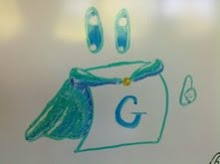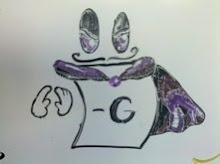Tomorrow I'm giving a final exam for Computer Organization, a common undergraduate course. The final consists of 40 multiple-choice questions.
I get very nervous when I tell colleagues that I give multiple-choice exams. No short or long answer sections. No write-some-code sections. Just easy multiple-choice questions. Oh, and often I have a True-False section too. I'm afraid other educators will see this as going too easy on my students.
As it turns out, I make it easier. I also let them bring a "Cheet Sheat" with whatever they want on it to the exam. (One piece of paper, handwritten, double-sided.)
Easy enough yet? Not quite. I also give them a practice exam ahead of time, with questions that could also appear on the exam. There is almost always overlap.
Why do I set them up for such over-success? A quick list of why I think this is okay:
* My questions are quite difficult. I often try to give them multiple parts to force them to work through a lot of details to figure out which answer is actually correct. Some of the questions are basic, but others require a lot of consideration.
* I want my students to learn the knowledge-level material. If I let them bring ultra-condensed notes, I know they'll spend the time writing it all out, which usually commits it to memory. Often they don't have to reference it at all, which saves them time anyways.
* I want them to comprehend the material. The time they spend on the practice exam is time well-spent. I don't give them an answer key, and agree to only talk about one problem at a time. Then they do their best to understand the material from the beginning.
* I don't want to test their ability to write code. Almost any time they're doing that in the "real world", they'll have Internet access. Why force them into an unnatural programming environment? They have projects all semester that test this reasonably.
* I don't want to scale exams. Really. I don't remember the last time I've done any scaling. (It hasn't been that long, though; I've only been a professor for 5 years.) I really like being transparent about grading; scaling makes that more difficult.
* Grading is tough enough. Especially grading open-ended things, because then it is so easy to be influenced by outside factors (including handwriting and comparisons between students and the order you see each exam). I really don't like making subjective judgements on grades.
* Questions and answers can be leading. Learning things on exams is great. Didn't know how Excess-127 notation works, but figured it out during the exam you've been worried about for days? Yeah, I bet that will stick with you. :)
* My errors can be easily corrected! Students are always pointing out errors in the exam during the exam. I rarely survive an entire exam without every error found and picked apart. I let them know right away that if they think they see an error, they're probably right and should let me know right away! This reduces tension over all.
Do these exams replace difficult take-home exams for upper-level courses? No. But for intro-level courses, I think they are great at maintaining fairness and enhancing student confidence.
Jokes from the Audience
5 days ago



